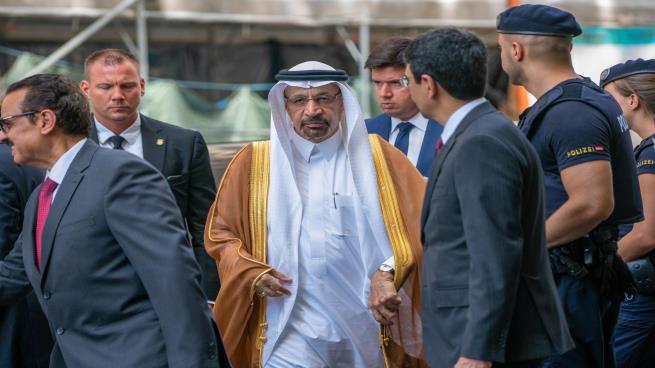
Mohammed bin Salman stripped Khalid al-Falih of his last official post in the Kingdom after reports of disagreements between the two men over the crisis over the failure of Aramco’s oil police to go public.
Al-Faleh was stripped of his last official post, the chairman of the board of directors of the Saudi Arabian Mining Company (Ma’aden) by appointing Yasser Al-Rumayyan, governor of the Public Investment Fund, as chairman.
The company said former energy minister Khaled al-Falih had resigned as a sovereign wealth fund representative on the company’s board.
Al-Rumayan also replaced Falih, who was a non-executive member of the company’s board, Maaden said.
A statement on the Saudi bourse website said that Falih’s resignation was due to “special circumstances” and said Falih had a “prominent role in achieving the company’s objectives.”
This comes weeks after Al-Rumayyan succeeded Al-Faleh as chairman of the state-owned Aramco.
Prince Abdul Aziz bin Salman, son of the Saudi king, succeeded al-Faleh as energy minister.
Al-Falih oversaw more than half of Saudi Arabia’s economy through a giant energy ministry established in 2016 to help smoothly implement new reforms.
Despite ambitious plans for industry and mining, these sectors have seen relatively little improvement.
The Ministry of Energy, Industry and Mineral Resources, which was established to help coordinate the new reforms adopted by Mohammed bin Salman relating to Vision 2030. The man suddenly lost all positions within a short period without knowing the real reason behind all this collective and sudden anger on him of energy and the most powerful oil in the world.
In less than a month, Khalid Al-Falih lost all his posts. On September 7, Saudi King Salman bin Abdulaziz Al Saud issued a royal order exempting al-Falih from the Ministry of Energy and appointing his son Prince Abdulaziz bin Salman in his place.
Falih was then sacked from the presidency of the world’s largest oil company, Aramco, which manages the world’s second-largest proven oil reserves and the world’s largest crude oil producer.
He was also exempted from other important positions, including membership of the Board of Directors of the Public Investment Fund, which serves as the Kingdom’s sovereign wealth fund.
Until the beginning of this month, Khalid Al-Falih was the most powerful man of energy and oil, not only in Saudi Arabia, but in the whole world. The man was fully and strongly supported by the Crown Prince and awarded with the King Abdulaziz Medal of the First Class in 2009. He served as the Ministry of Health for years.
Al-Falih was responsible for coordinating between Saudi Arabia, Russia and major producers on energy issues, determining oil price trends, and the volume of production cuts to maintain price stability around the world.
But suddenly Falih, the powerful man, lost all his positions, and came out of the energy sector completely empty-handed, even without being given the presidency of even a small company, he came out today from the presidency of the state-owned Maaden to replace Yasser bin Othman Al-Rumayyan.
There have been many explanations for the overthrow of Khalid Al-Falih in such a rapid manner, for example, what was said about his opposition to the Aramco shares, and the placement process in the international markets has faltered during the last period, but this reason may seem unconvincing, as the oil policy maker in the Kingdom is not the Minister of Energy And oil, but the king and his crown.
Al-Falih has made relatively little progress, as has been reported, and has also discarded many investment projects related to Aramco and the energy sector, according to Saudis involved.
There are those who talked about the existence of cracks within the Ministry of Energy during the tenure of Al-Falih, which prompted the decision-maker to reduce the powers of the man and withdraw the Ministry of Industry and Mineral Resources from it, and then stripped him of his full authority on the sector and its followers.
Whatever the reasons, we do not expect anyone to reveal the secret of all this sudden anger to the most powerful energy man in the Kingdom, Khalid Al-Falih, and whether it was related to the escalation of one of the sons of the king to lead the most important energy file in the Kingdom in terms of economic and political, or not Abdulaziz bin Salman is the first member of the ruling family to become energy minister of the world’s largest oil exporter. The oil portfolio was handled by five ministers since 1960, none of whom were members of the ruling family.